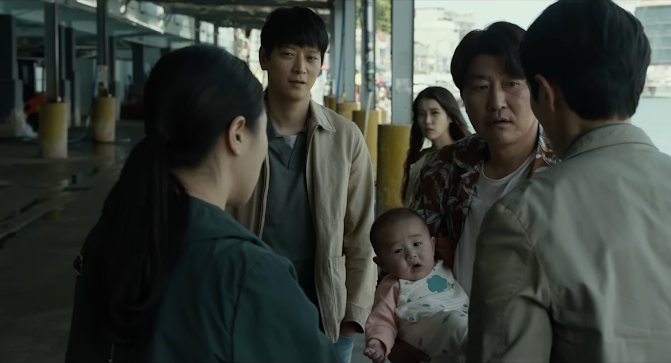And so a new year in cinematic culture commences, and as is often the unfortunate case so soon after the holiday tentpole and awards-season rushes, the pickings have been pretty slim for the past couple weeks. Now is really the time for the slow-rolling arthouse critic's picks of last November and December to finish soaking up the residual traces of engaged or curious theatergoers, whereas some foreign flicks are still just testing the waters of their major metropolitan premieres.
Such is the case with Broker, a South Korean production written, directed, and edited by Japanese auteur Hirokazu Kore-eda, which already made a decent box office splash when it was released nationally last summer, and is now getting a stateside rollout courtesy of big-indie distributor Neon. A continuation of Kore-eda's focus on poverty, at turns cynical and sympathetic portraits of outcasts and criminals, and the unorthodox familial ties that form between them, Broker stars Song Kang-ho and Gang Dong-won as Sang-hyeon and Dong-soo, a gambling debt-saddled dry laundry owner and a part-time volunteer at a local church, who work together to steal infants from the church's "baby box" (a safe drop-off point for mothers to anonymously abandon their newborns). Sang-hyeon and Dong-soo's aim is to sell these babies on the illicit adoption market; and though So-young (Lee Ji-eun), the teenage mother of their latest foundling Woo-sung, leaves a note promising to return for him, Sang-hyeon and Dong-soo take this for granted as a sure sign of the opposite. Well, the guilt ridden So-young does return, and when she rather easily tracks down the two "brokers," they convince her to allow them to keep Woo-sung, on the condition that she accompany them on their cross-country road trip in order to vet the baby's prospective parents, and, of course, to split the earnings 50-50.
If a distressed teenage mother managing to work her way into this illicit operation so easily gives the impression that Sang-hyeon and Dong-soo don't actually run the most airtight business in the world, it also won't come as a surprise that Detective Soo-jin (Doona Bae) and her younger protege Detective Lee (Lee Joo-young) are hot on their trail. Lee notes that they could rather easily nab Sang-yeon and Dong-soo for kidnapping, but Soo-jin insists that it would be better to catch them in the act of actually selling Woo-sung. (Foiling a "human-trafficking" ring looks a lot better on paper than simply rescuing one baby from illegal adoption to then just shove it along through the legal adoption system.) With Kore-eda's perspective frequently shifting between the criminals and their pursuers, the more conflicted and compassionate Lee gradually becomes something of a didactic cypher for the film's intersecting themes, the irony of Sang-hyeon, Dong-soo, and So-young coming together as an unorthodox family contrasted with Soo-jin's unwavering condemnation and, none too subtle from the get-go, cynical and careerist ambitions. As their tactics escalate in pursuit of their goal, the authorities themselves, you see, become complicit; "brokers" of sorts, themselves.
Broker represents both an interesting and underwhelming development in Kore-eda's filmography. Having already established himself as one of Japan's most internationally well-received filmmakers, with a body of work that includes both documentaries and feature fiction films, it rather obliquely functions as a companion piece to his 2018 hit Shoplifters and, following his first international production The Truth, the branching of his understated, humanistic, and socially-conscious cinema outside of the borders of his home country. But whereas Kore-eda's strengths as a filmmaker have always been best conveyed by his capacity for lacing otherwise patient and unobtrusively observational narratives with kernels of devastating insight and irony, Broker ultimately regresses into bland, crowd-pleasing sentimentalism. If Shoplifters worked so well because of its own complex representation of its desperate, outcast family as both materially and morally compromised by their condition, deeply challenging the spectator's preconceptions of where cynical dependence ends and true love begins, Broker strains credulity through its patronizing, excuse-making, and ultimately rather wooden portrayal of both its law-breakers and law-enforcers. The performances in the film are uniformly mediocre, largely because none of the actors have any meaningful contrasts against which to play, with the exception of being rendered the mouth-pieces of Kore-eda's shallow dialogue. None of his principal cast members are afforded the sound dignity of portraying a truly bog-standard, cynical human being, which more than anything puts to bed any pretense of authenticity in the director's supposedly humanist and socially conscious vision.
It's not all travesty. Despite how flatly most of Kore-eda's attempts at melodramatic humor tend to fall, there are some genuinely funny moments and ingenious twists peppered throughout Broker. But while the technical competency of the production and the general "vibe" of muted international arthouse cinema to which it caters may prevail upon some audiences to overlook its more cloying and cliche qualities, there is to some extent something genuinely obsequious about the film. Its notions of human interest are so artificial, and its melodrama so detached from the plausible, while at the same time pandering so obviously to a more mainstream type of genre cinema - in this case, the road movie - that its flaws somehow come off as more spiritual than technical. For a director whose earlier documentary output is so blisteringly critical of the established order of the times in which they were made, Broker feels like nothing short of the vanilla extract of the most escapist ideological fantasy.

Comments
Post a Comment